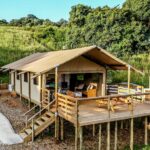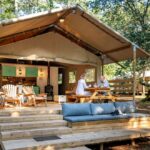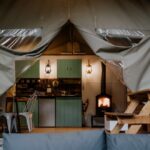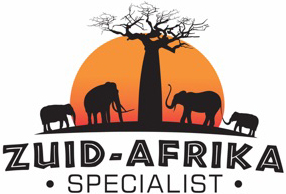Africamps at de Pakhuys Cederbergen

Cederbergen area
Known for its dramatic wind-carved sandstone formations, vibrant springtime flowers, and ancient rock art of great archaeological significance, the rugged Cederberg landscape is a place of unique and diverse natural beauty.
AfriCamps at de Pakhuys is located in the heart of the Rocklands in the northernmost part of the Cederberg Wilderness Area, 26 km from Clanwilliam en route to the historic Wuperthal village. Nestled between striking rock faces and picturesque vineyards in the Agter-Pakhuis Valley, 10 fully equipped boutique glamping tents welcome nature lovers, adventure seekers, avid boulderers, and those simply looking to recharge in nature, to a peaceful corner of the vast and beautiful Cederberg overlooking the Pakhuis Mountains.
Rocklands is an alluring and mysterious area covered in dramatic boulders and crags. These ancient rock formations offer some of the best bouldering and climbing sites in the world, attracting bouldering communities from across the globe, and de Pakhuys Guest Farm, their favourite place to retreat while they take on the different bouldering spots around the area.
Multiple hiking trails meander between boulders across the property, with welcome sights like rock pools, San rock art, and even a waterfall along the way. If you’re lucky, you might even spot the elusive Verreaux’s eagle nesting high against the cliffs. A scenic drive to the top section of the farm (accessible only with a 4×4 vehicle) takes you to 60 hectares of rooibos tea lands, 260 hectares of unspoiled fynbos gorges blooming with wildflowers in season, and a rock cave – the perfect spot for a picnic. Take a more laidback approach and spend the day at the camp swimming in the farm dam, fishing for bass in the neighbouring farm dam, or sipping on some fine wines at the winery next door.
When visiting the camp, one is surrounded by a landscape brimming with history. The area is home to magnificent sandstone boulders, carved and sculpted by the elements over thousands of years. Cederberg hosts some of the best-known San rock art in Southern Africa, which many believe to be the richest legacy of rock art on the planet. Thankfully, these sites form part of the Cederberg Wilderness Area which has been protected by Cape Nature since 1973. Dubbed the ‘rooibos capital of the world,’ the Cederberg is the only place in the world where rooibos tea (an iconic South African drink that has been enjoyed for over 300 years) grows naturally.
Bouldering
With 3 771 routes in 86 crags, Rocklands is a bouldering paradise. This dramatic sandstone landscape has become increasingly popular as a world-class climbing destination amongst the international climbing community, offering some of the top bouldering sites in the world. The main bouldering area for Rocklands can be accessed from a parking lot near the top of Pakhuis Pass, which offers widespread views over the distinctly rugged and craggy sandstone landscape.
Crash pads are available at the camp and can be booked in advance.
Black Diamond DropZone: R130 per day
Black Diamond Mondo: R150 per day
Single pad (second season): R90 per day
Please note: No climbing is allowed in Rocklands without a valid climbing permit. Permits can be obtained online or purchased at reception.
Hiking trails
The lesser-known northern Cederberg mountains and surrounding Rocklands are home to some of the most scenic hiking trails in the Cederberg. Some of these quieter trails are unique in that a fellow walker might not be seen for a couple of hours or throughout the entire trail.
The Pakhuisberg Day Hike (10.2 km from camp)
A circular 13 km hike both starting and finishing at the Kliphuis campsite entrance. This moderately difficult hike takes you into Pakhuisberg, offering elevated views of the surrounding rocky landscapes and peaks with close-ups of indigenous wildlife and the diverse fynbos vegetation. Permits must be purchased from the Kliphuis campsite office before the hike.
The Heuningvlei Jeep Track (7.2 km from camp)
The Heuningvlei Jeep Track hike is said to be one of the most scenic hikes in the Western Cape. This moderately difficult hike (depending on how far you go) offers breathtaking views of the surrounding raw Rocklands landscape and expansive Agter Pakhuis Valley. The entrance to the hike is from the gravel parking at the top of the Pakhuis Pass. You can either walk all the way to Heuningvlei, (which is about 11 km away) or turn back at any point you like.
The Sevilla Trail (7.6 km from camp)
A relatively easy 5 km walk from Traveller’s Rest Farm. This fascinating San rock art trail takes you passed nine different rock art sites while following the Brandewyn river. The Sevilla Trail is a comfortable walk that offers insight into ancient San cultures. Local farm game including Springbok, Eland, and Hartebeest may be seen along the trail as well as the common “dassie” (or rock rabbit) and local baboon troops. In addition to the intricate indigenous “fynbos” that surrounds the Sevilla Trail, during springtime, the wildflowers offer an even further depth of beauty to this historically enriching experience. Permits for the Sevilla Trail can be obtained from the Traveller’s Rest farmstall, where a free basic description of the nine rock art sites is available.
San rock art
The Cederberg mountains are home to some of the best-known San rock art sites in Southern Africa, which is thought to have the richest legacy of rock art on the planet. There are over 2 500 known rock art sites in the broader Cederberg region, dating between 250 to as old as 8 000 years. These ancient rock paintings are therefore extremely important sites of Southern African ancestry, offering insights into a time and culture which has largely disappeared.
The best way to explore these historic sites is along the Sevilla trail, a relatively easy 5 km walk from Traveller’s Rest Farm. This fascinating San rock art trail passes nine different rock art sites while following the Brandewyn river.
Rooibos tea tastings
Rooibos tea is an iconic South African warm drink that has been enjoyed by locals for more than 300 years. With the Cederberg being the only place on the planet where rooibos grows naturally, it is only fitting to learn more about this beloved drink on a tea tasting.
House of Rooibos
House of Rooibos, a relatively new initiative of Rooibos Ltd., the largest rooibos tea producer and distributor in the world, offers an extensive variety of rooibos teas including original, organic, and flavoured teas. A variety of 13 different rooibos and honey-bush teas are available in the tearoom and tea garden, along with rooibos cappuccinos, milkshakes, iced teas and ice creams.
Rooibos Tea House
Rooibos Tea House stocks over 100 rooibos blends and flavours which range from natural, herbal, fruity, and sweet, to green, spicy and floral. These are all available for both tasting and purchase. They also offer a unique tea tasting which allows you to choose any seven rooibos teas and enjoy them while reading about the history of rooibos, the production process, and some further facts about this famous South African tea.
Visit the historic Wupperthal village
A visit to the historic Wupperthal village offers a rare window into a village of the early 1800s. The village seems to have gotten lost in time, consisting of quaint thatched cottages portraying the Cape Dutch style in all its glory. Although this beautiful missionary village is only a straight 25 km southeast of Clanwilliam, the road takes you through 75 km of breathtaking scenery, down into the Tra-Tra Valley at the northern foothills of the Cederberg Wilderness Area. The village was established in 1828 by two Rhenish missionaries, Johann Gottlieb Leipoldt and J von Wurm.
Muisbosskerm open-air restaurant
For a seafood experience of a lifetime, unique to the West Coast, pay a visit to Muisbosskerm! The restaurant is an hour’s drive from the camp but should not be excluded from your bucket list. Offering the West Coast’s most sought-after seafood dishes like crayfish, a wide variety of fish, baked, smoked, and grilled, the traditional waterblommetjie stew, to the ever-fresh homemade bread straight from the clay-oven, with homemade butter, this is a dining experience that cannot be missed.
Donkey cart adventures
Explore the rugged, wild beauty of the Cederberg on a donkey cart adventure trail. Donkey carts are the traditional way to travel in the Cederberg – locals used to use donkeys to carry their produce to Clanwilliam. The route begins at the top of Pakhuis Pass, where you can leave your car. The two-and-a-half-hour trail ends in the charming Heuningvlei village, one of the 14 Moravian Mission Church outposts. The small local community is known for its production of traditional dried fruit and organic rooibos tea.





Wat do you think of this accommodation?
Let us know!
